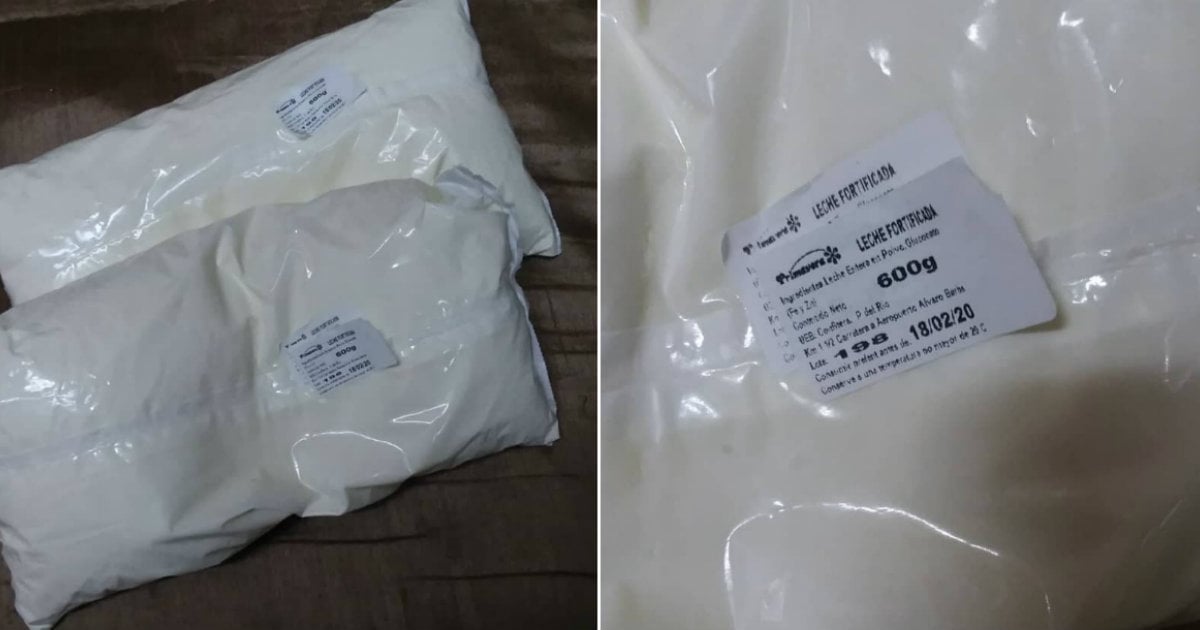
A doctor from Sancti Spíritus expressed her outrage on social media this Tuesday as she recounted her inability to purchase a can of powdered milk for her daughter, the price of which on the black market amounts to two months of her salary while she is on maternity leave.
Danielly Aróstica shared her testimony on Facebook, highlighting the economic crisis and the precarious living conditions on the island, especially for healthcare professionals.
“I, a Cuban doctor with a basic salary of 5,000 Cuban pesos, and currently receiving 3,400 pesos due to maternity leave, need two months' worth of salary to buy my daughter a can of milk on the black market. A can that doesn’t even last a month if she drinks two 8-ounce glasses a day,” he reported.
The doctor explained that, although her daughter was assigned a special diet of two bags of whole powdered milk per month, this was often replaced by an occasional liter of liquid milk, which was frequently spoiled.
"The higher-ups decided it was too much," he pointed out with frustration, referring to the authorities' lack of interest in ensuring that essential food supplies were provided for the most vulnerable.
"It is only me, our family, and friends who have done the impossible to ensure she has everything she needs that matter," the mother stated, blaming the regime for the lack of milk for her child.
The case of her daughter is particularly critical due to her delicate health condition, as she suffers from autosomal recessive polycystic kidney disease, secondary hypertension with left ventricular hypertrophy, portal hypertension, esophageal varices, erythematous-hemorrhagic gastritis, severe splenomegaly, severe iron deficiency, hepatic cirrhosis, splenorenal shunts, bronchial asthma, and atopic dermatitis.
"We live in a country where we are worth nothing, where we are nobody because I don’t have the money to buy what makes life valuable in this country," he stated.
In addition to basic food items, families face high monthly expenses for medications and transportation to hospitals, which undermines the official narrative that healthcare and medicines are free in Cuba.
The doctor concluded her statement by highlighting the dehumanization of a system that disregards the basic needs of its citizens and life itself: "We had the misfortune of living in a country where we are worth nothing."
His testimony reflects the desperation of thousands of Cubans who face a collapsed economy and a system unable to meet their most basic needs on a daily basis.
The deprivation and scarcity affecting Cubans hit particularly hard on children, especially those facing illnesses.
For example, the Government of Santiago de Cuba announced this Monday that it does not have a sufficient inventory of powdered milk to meet the needs of children aged 2 to 6, a situation that exacerbates the already critical food shortages in the province.
According to the information shared by Lácteos Santiago de Cuba on Facebook, the current distribution is limited to children under one year old, who will receive an additional 10-day supply of milk, totaling 20 days in November.
In October, over 11,200 children in the province of Matanzas went without milk during the last week, due to the blackout that left all of Cuba without electricity for five days, according to official sources.
The collapse of the national electric system made it impossible to distribute milk in the western province, as it prevented the food from being refrigerated prior to industrial processing, authorities revealed on Wednesday.
However, the problem is old and also finds convoluted solutions.
In February, the authorities in Ciego de Ávila announced that children aged three to seven, as well as those with chronic illnesses requiring a special diet, will receive only half a liter of milk and a quantity of vitamin-fortified instant drink due to the shortage of powdered milk.
In August, a group of Cuban mothers expressed their outrage that the children's milk had not been distributed in the bodegas of Havana, despite the month nearing its end.
"Today is August 22, and in my store in Cerro, we have only received 700 grams of milk for children over three years old this entire month," said a woman in the Facebook group "Cuban Mothers for a Better World."
Filed under: